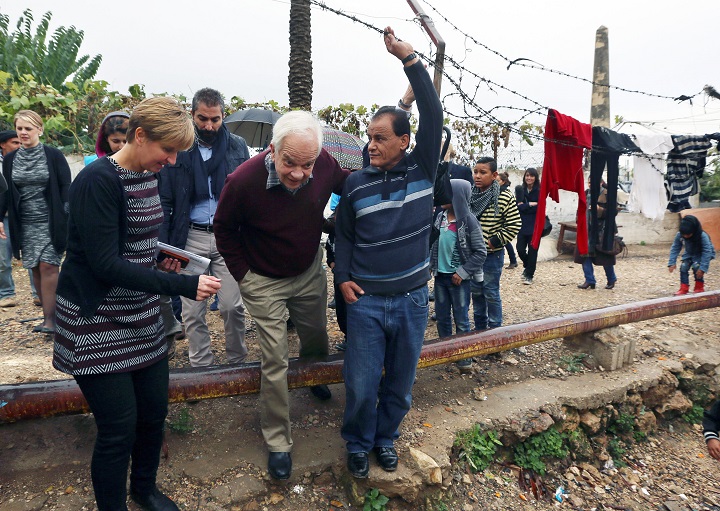Canada’s immigration minister drew a few raised eyebrows at a Senate committee meeting on Wednesday morning when he cited “a cultural element” as a possible explanation for Syrian refugees making use of food banks.

John McCallum was appearing before the Senate Human Rights Committee to update senators on the progress of resettlement efforts for the tens of thousands of refugees who arrived over the last few months from war-torn Syria and the surrounding regions.
Asked by Conservative Sen. Salma Ataullahjan about the refugees relying on food banks, the minister said it’s to be expected at the moment, because many are living off the equivalent of a social-assistance cheque each month.
READ MORE: Surrey Food Bank struggling to keep up with demand
The government did not want to provide refugees with more financial support than what a Canadian citizen on social assistance would receive, McCallum explained, because that would not appear fair. The private sector has stepped up to boost the monthly refugee support in some cases, he added.
But then McCallum added that “there may be a cultural element” to the food bank use.
“Because you have to remember that the refugees are coming from an entirely different world … sometimes they’ve been living in refugee camps, sometimes it’s the norm to be offered meals,” he said.
Ataullahjan, who was born in Pakistan, said the comment had “thrown me.”
“I thought you relied on food banks because you need food,” she said, before swiftly moving on to another line of questioning.
Food banks from Toronto to Surrey to Charlottetown have reported spikes in use over the past several months, with some saying the government and private sponsors are not picking up enough of the financial slack for refugees. While food banks anticipated some increase in demand over time, one director in Toronto recently told the Toronto Star that it happened almost immediately after the refugee program kicked into high gear.
Language, jobs issues ‘not resolved’
McCallum directly addressed some of the major challenges associated with welcoming over 25,000 privately and publicly sponsored refugees on Wednesday, saying that the biggest issue — housing — has largely been resolved. About 98 per cent of the new arrivals now have a permanent roof over their heads, he said.
The major battles now, according to McCallum, are language and jobs. In order to integrate successfully, Syrians have to learn either English or French and find employment.
WATCH: Five months later, how are Syrian refugees settling in B.C.?

“Those issues certainly are not resolved, especially when you look at government-assisted refugees,” he said, explaining that Canada asked the United Nations for the most vulnerable people, “and we got them.”
The government-assisted refugees often don’t speak a word of English or French, and many come from rural areas of Syria. They have lower levels of education as a result, McCallum said.
READ MORE: Syrian refugees give Heritage Minister Joly an earful over difficulty finding jobs
The minister told the senators, however, that he’s confident that in the “medium term” these Syrians will be able to take advantage of government-sponsored programs to brush up on language and gain marketable skills.
“We’ve committed just short of a billion dollars for this project,” he said. “It has truly become a national project.”
That doesn’t mean everyone is happy about it, however. McCallum acknowledged there has been backlash, and racism, as the Syrians have arrived in cities and towns across the country.
READ MORE: Pepper spraying fails to deter Syrian refugees
“On an international scale we do well … but we are far from perfect and I’m acutely aware of this situation,” he said.
“That’s why I’ve said more than once that we don’t want to give more to refugees than we do to Canadians … you have to be careful. I think Canadians are welcoming, but they don’t want to treat the newcomers better than we treat our own people.”


Comments